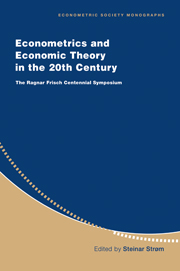Book contents
- Frontmatter
- PART I RAGNAR FRISCH AND HIS CONTRIBUTIONS TO ECONOMICS
- PART II UTILITY MEASUREMENT
- 4 Nonparametric Estimation of Exact Consumer Surplus and Deadweight Loss
- 5 Consumer Demand and Intertemporal Allocations: Engel, Slutsky, and Frisch
- PART III PRODUCTION THEORY
- PART IV MICROECONOMIC POLICY
- PART V ECONOMETRIC METHODS
- PART VI MACRODYNAMICS
- PART VII MACROECONOMIC PLANNING
- Author Index
- Subject Index
5 - Consumer Demand and Intertemporal Allocations: Engel, Slutsky, and Frisch
from PART II - UTILITY MEASUREMENT
Published online by Cambridge University Press: 05 January 2013
- Frontmatter
- PART I RAGNAR FRISCH AND HIS CONTRIBUTIONS TO ECONOMICS
- PART II UTILITY MEASUREMENT
- 4 Nonparametric Estimation of Exact Consumer Surplus and Deadweight Loss
- 5 Consumer Demand and Intertemporal Allocations: Engel, Slutsky, and Frisch
- PART III PRODUCTION THEORY
- PART IV MICROECONOMIC POLICY
- PART V ECONOMETRIC METHODS
- PART VI MACRODYNAMICS
- PART VII MACROECONOMIC PLANNING
- Author Index
- Subject Index
Summary
Introduction
Individual consumers often are assumed to follow certain relatively simple budgeting rules when making expenditure decisions. For example, how much to save may be decided upon almost separately from decisions on how much to spend on food, services, and other day-to-day consumables. Of course, it is well known that such “decentralized” budgeting decisions can fit well within standard consumer theory. Indeed, the sequential nature of consumer budgeting decisions not only makes tractable the decision-making problem for the consumer but also makes it possible for the empirical microeconomist to build up a picture of consumer behaviour from a sequence of relatively straightforward estimation steps.
In his 1959 Econometrica paper “A Complete Scheme for Computing All Direct and Cross Demand Elasticities,” drawing on his earlier 1932 study, Frisch saw the power of the sequential approach to analysis of consumer demand. He also developed a method for interpreting demands directly in terms of the marginal utility of money and prices when studying the analysis of allocations across groups. In particular, he considered the case in which groups were additively separable - what he termed want-independent - in which case these “Frisch” demands depended simply on own prices and marginal utility. Because marginal utility is equated across groups, the allocations between and across groups are cleverly simplified.
Information
- Type
- Chapter
- Information
- Econometrics and Economic Theory in the 20th CenturyThe Ragnar Frisch Centennial Symposium, pp. 147 - 166Publisher: Cambridge University PressPrint publication year: 1999
